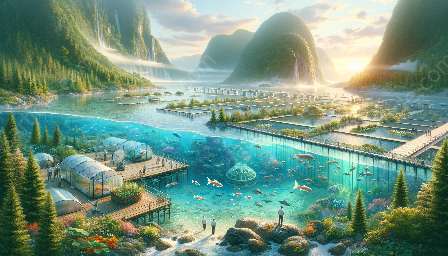Aquaculture legislation and policy play a crucial role in regulating the thriving industry of aquaculture, which intersects with fisheries science and applied sciences. This topic cluster aims to provide a comprehensive view of the complex regulations and policies that govern aquaculture products and practices.
The Significance of Legislation and Policy in Aquaculture
Aquaculture, also known as fish farming, involves the breeding, rearing, and harvesting of aquatic organisms under controlled conditions. The industry has experienced significant growth over the years, driven by the increasing demand for seafood and the depletion of wild fish stocks. In light of this expansion, effective legislation and policy frameworks are essential to ensure sustainable and responsible growth within the aquaculture sector.
Regulatory Framework for Aquaculture
The regulatory framework for aquaculture encompasses a wide range of laws, regulations, and policies at the international, national, and local levels. At the international level, organizations such as the Food and Agriculture Organization (FAO) of the United Nations provide guidelines and recommendations for the responsible and sustainable development of aquaculture. These frameworks aim to address issues related to environmental sustainability, food safety, and the welfare of workers in the aquaculture industry.
Nationally, governments have the authority to establish laws and regulations specific to aquaculture within their jurisdictions. These regulations cover areas such as site selection, water quality management, species selection, and disease control. National policies may also address issues related to licensing, permits, and the allocation of aquaculture leases or concessions.
Local regulations often focus on zoning, land use, and the integration of aquaculture operations with other coastal or marine activities. These regulations play a critical role in addressing potential conflicts between aquaculture activities and other stakeholders, such as recreational boaters, conservation groups, and tourism operators.
Interplay with Fisheries Science
The field of fisheries science is deeply interconnected with aquaculture legislation and policy. Fisheries science encompasses the study of aquatic ecosystems, fish populations, and the sustainable management of fisheries resources. As such, it provides valuable scientific insights that inform the development of aquaculture regulations and policies.
Scientific data and research findings form the basis for setting limits on aquaculture production, determining suitable locations for aquaculture operations, and establishing protocols for disease prevention and control. Additionally, fisheries science contributes to the assessment of the environmental impact of aquaculture activities, helping to ensure the sustainable coexistence of aquaculture and wild fisheries.
Integration with Applied Sciences
Applied sciences, including disciplines such as biology, genetics, engineering, and environmental science, are integral to the advancement of aquaculture techniques and practices. Legislation and policy in aquaculture often draw upon the latest advancements in applied sciences to address emerging challenges and opportunities within the industry.
For instance, advancements in genetics and biotechnology have led to the development of selectively bred and genetically improved aquaculture species. Regulatory frameworks play a role in ensuring the responsible application of these scientific advancements, addressing concerns related to biodiversity, ecological impacts, and resource management.
Likewise, the integration of environmental science and engineering principles informs regulations related to waste management, water quality monitoring, and the development of sustainable aquaculture infrastructure. By leveraging insights from applied sciences, legislation and policy in aquaculture strive to uphold ecological balance and minimize the environmental footprint of aquaculture operations.
Challenges and Future Directions
Despite the progress made in establishing regulatory frameworks for aquaculture, the industry faces ongoing challenges that necessitate continuous policy review and adaptation. Issues such as invasive species, disease outbreaks, and the potential for genetic escape from aquaculture stocks into the wild pose complex regulatory dilemmas that require interdisciplinary solutions.
Moreover, the dynamic nature of aquaculture necessitates policy flexibility to accommodate technological advancements, market trends, and shifting environmental conditions. As such, the future of aquaculture legislation and policy will likely involve ongoing collaboration between policymakers, scientists, industry stakeholders, and environmental advocates to address emerging challenges and seize opportunities for sustainable innovation.
Concluding Remarks
The topic cluster on aquaculture legislation and policy provides a comprehensive exploration of the intricate regulatory landscape governing the aquaculture industry. By examining the interplay between legislation, fisheries science, and applied sciences, this cluster highlights the multidimensional nature of aquaculture governance and the complex challenges it seeks to address. Moving forward, a nuanced understanding of the legislative and policy aspects of aquaculture is essential for fostering sustainable growth and responsible stewardship of aquatic resources.

